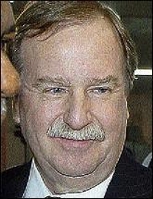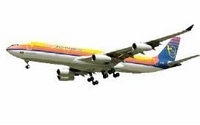Summer schedule expected to strengthen Air Jamaica
Published: Wednesday | April 8, 2009

Nobles
WESTERN BUREAU:
WOMEN CELEBRATING four decades normally describe themselves as '40 and fabulous'.
In the case of national carrier, Air Jamaica, such optimism might be over the top.
Air Jamaica's first flight on April 1, 1969 involved a twin-jet DC-9 with approximately 90 passengers and crew and departed the Norman Manley International Airport for Miami.
Forty years later, and on the brink of being acquired by new owners, the airline's president and CEO, Bruce Nobles, is confident that the national carrier has reached a stage where its success can be measured by its reliability and dependability record, which has seen improvements.
Dependability
"Reliability is now up at 99.2 per cent, because we are virtually not cancelling any flights anymore," he boasted to The Gleaner, cognisant that the company has lost many of its customers over the years as a result of late arrivals and departures and frequent cancellations.
In fact, up to last summer the airline's dependability was dismal, struggling at a rate of 25-35 per cent. In 2009, it is 65 per cent and growing.
"We have made great improvements. The increase in the airline's success rate was crucial in order for us to survive," Nobles said in a one-on-one interview at his Harbour Street, downtown Kingston, offices recently.
Primary missions

"Air Jamaica has had three primary missions since it was established on April 1, 1969," Nobles explained.
"To serve the people of Jamaica here and overseas; to serve and support the vibrant tourism industry (one of the risks a tourism-dependent nation faces is the disadvantage of not having their own national carrier); and to support business and trade."
However, Nobles admits that the airline has had to streamline its operations in order to service viable routes. Hence, the recent cuts in a number of routes, including popular Miami, Los Angeles and Atlanta, resulting from a new business plan which seeks to have a leaner airline, reducing cost by US$150 million over the losses incurred in 2008 and realising a profit by this summer.
Challenging year
"The year 2008 was very challenging," said the airline president, while pointing to the forces that created the challenges. "We faced three major issues: oil went up to US$147 per barrel, causing a huge impact on expenses, and a significant portion of our fleet go through periodic maintenance checks."
Some 12 of the airline's 14 aircraft went through 12-year checks. The discovery of major issues such as corrosion caused the planes to remain on the ground for longer periods, resulting in several cancellations and inconvenience to passengers, said Nobles.
As if that was not enough, the airline was still reeling from the effects of the company's decision to stop flying to London, England, and had to pay a substantial sum to its lessees for the planes it returned before the end of their contracts.
"None of those things will happen this year," Nobles beamed with pride, as he revealed a summer schedule of extra sections which will play a pivotal role in the airline's revenue potential.
Extra sections
"We are increasing frequency in Ft Lauderdale to a fifth daily flight and a fourth daily flight out of New York to Kingston and Montego Bay, while Orlando will move from five to six days per week," he stated, noting that the demand is usually up during this period because Jamaicans come home and children are out of school.
"We will end up with more people waiting to make reservations than available seats, and that is why we add extra sections."
The airline will reduce its 14 aircraft to nine. Come June, when the privatisation is expected to take place by one of three non-Jamaican companies, Nobles sees a strengthening of the airline's balance sheet.
janet.silvera@gleanerjm.com








